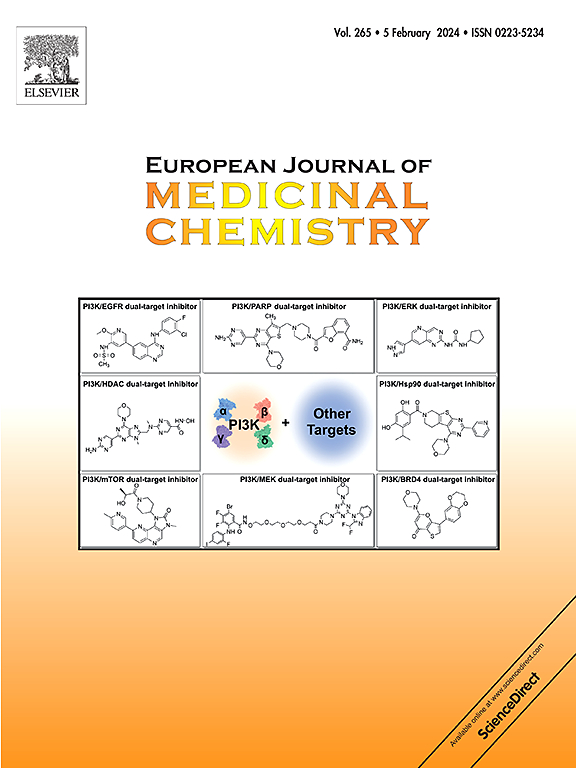n端随机卷曲-串联α-螺旋肽7W:通过色氨酸取代的有效抗菌和抗炎双效剂
IF 6
2区 医学
Q1 CHEMISTRY, MEDICINAL
引用次数: 0
摘要
研究了色氨酸取代对Medisin家族多肽MS-PT性质的影响。通过色氨酸取代MS-PT1中的疏水氨基酸,合成了一系列衍生肽。其中,7W肽以其独特的n端随机旋度和α-螺旋结构脱颖而出。在体外实验中,7W通过阻断MAPK/NF-κB信号通路,有效抑制lps诱导的膜近端巨噬细胞(MPMs)分泌IL-6、TNF-α等促炎细胞因子。与母肽MS-PT1相比,它对革兰氏阳性菌的抗菌活性更强,溶血率低,安全性好。在体内,在clp诱导的脓毒症小鼠模型中,7W减轻了肺和肝损伤,抑制了血清和组织中炎症因子的表达,并且具有较长的血浆半衰期,为46.8小时。机制上,7W优先与细菌模拟膜和LPS相互作用,其抗炎作用可能是通过与TLR4结合介导的。这些发现不仅阐明了色氨酸替代在调节肽性质中的作用,而且为开发多功能抗菌肽提供了新的策略,表明7W作为脓毒症和其他炎症性疾病的治疗剂具有很大的潜力。本文章由计算机程序翻译,如有差异,请以英文原文为准。


N-Terminal random curl-tandam α-helical peptide 7W: A potent antibacterial and anti-inflammatory dual-effect agent through tryptophan substitution
This study investigates the impact of tryptophan substitution on the properties of the Medisin family peptide MS-PT. By substituting hydrophobic amino acids in MS-PT1 with tryptophan, a series of derivative peptides were synthesized. Among them, the 7W peptide stood out with its unique N-terminal random curl and α-helix structure. In vitro, 7W effectively inhibited the secretion of pro-inflammatory cytokines like IL-6 and TNF-α in LPS-induced Membrane-Proximal Macrophages (MPMs) by blocking the MAPK/NF-κB signaling pathway. It also exhibited stronger antimicrobial activity against Gram-positive bacteria compared to the parent peptide MS-PT1, with good safety as indicated by a low hemolysis rate. In vivo, in the CLP-induced sepsis mouse model, 7W alleviated lung and liver injury, suppressed the expression of inflammatory factors in serum and tissues, and had a relatively long plasma half-life of 46.8 h. Mechanistically, 7W interacted preferentially with bacterial mimic membranes and LPS, and its anti-inflammatory effect might be mediated by binding to TLR4. These findings not only clarify the role of tryptophan substitution in modulating peptide properties but also offer a new strategy for the development of multifunctional antimicrobial peptides, suggesting that 7W has great potential as a therapeutic agent for sepsis and other inflammatory diseases.
求助全文
通过发布文献求助,成功后即可免费获取论文全文。
去求助
来源期刊
CiteScore
11.70
自引率
9.00%
发文量
863
审稿时长
29 days
期刊介绍:
The European Journal of Medicinal Chemistry is a global journal that publishes studies on all aspects of medicinal chemistry. It provides a medium for publication of original papers and also welcomes critical review papers.
A typical paper would report on the organic synthesis, characterization and pharmacological evaluation of compounds. Other topics of interest are drug design, QSAR, molecular modeling, drug-receptor interactions, molecular aspects of drug metabolism, prodrug synthesis and drug targeting. The journal expects manuscripts to present the rational for a study, provide insight into the design of compounds or understanding of mechanism, or clarify the targets.

 求助内容:
求助内容: 应助结果提醒方式:
应助结果提醒方式:


